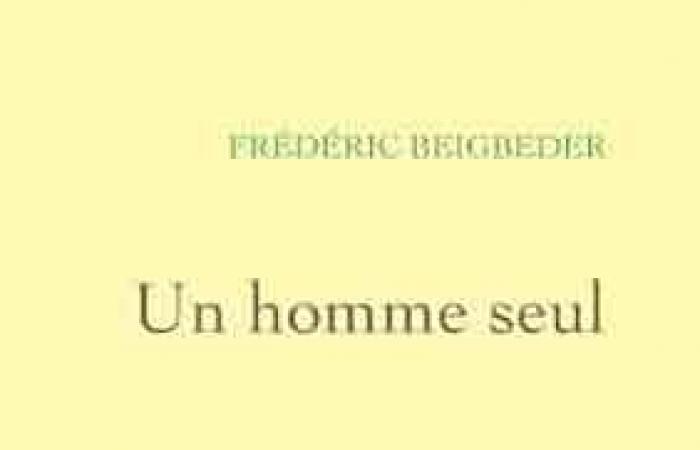With A man alone (Grasset, 2025), Frédéric Beigbeder writes one of his best books, if not the best.
We must be wary of children who write. They use family food to strengthen their romantic universe. Fathers are often in the spotlight these days. They don’t necessarily have the best role. The era hates virilism and wants to do battle with patriarchy. So the writers, who have for the most part remained children, because literature is the opposite of work as Georges Bataille reminds us, open the computers, rummage through the trash, read the emails, scrutinize the history of internet searches, in short , transform themselves into Commissioner Maigret in search of this “miserable little pile of secrets”, to use Malraux’s formula, cited by Frédéric Beigbeder.
This father he thought he hated
Let’s say it from the outset, A man alone is surely one of Beigbeder’s best books, if not the best. The analysis is relevant and the style refined; the formula slams and emotion arises where the story seemed cold as granite, especially when reaching the too short chapters 30 and 31, that is to say saying goodbye to Jean-Michel Beigbeder (1938- 2023), father of Frédéric. He makes him a real character in a novel, to be placed halfway between Roger Martin du Gard – totally forgotten today – and Ian Fleming: “He was a Frenchman who believed himself to be an American even though he was English” . We had vaguely heard of this stout man who, after solid management studies at Harvard Business School, had imported to France the profession of “headhunter” (executive search), “placing” all the directors of the CAC 40 for fifty years. A man without faith or law, as it were, using immoral practices in a system that refutes all supreme values and replaces them with a single watchword: make money. The very well-read – hypokhâgne, khâgne – and skillful Jean-Michel did not hesitate to poach talented people to integrate them into the organizational charts of prestigious companies. Its motto: “Economic war is the only one in which deserters are rewarded.” Not enough to make the man sympathetic, despite a trajectory worthy of The man in a hurry, electric novel by Paul Morand, with the probable hypothesis of having been a correspondent of the CIA, that is to say an “agent” acting against the interests of France since the Americans have always tried to destabilize our country, notably under de Gaulle who knew the meaning of the word independence.
Also read: When TV made you hungry!
Brilliant father, enjoyable, selfish, not to say narcissistic, indifferent especially to his two sons, Charles and Frédéric. The man who was once a handsome young man with dark eyes, well-groomed hair, a clean parting on the side, died completely ruined, alone, from cancer of the bile ducts, after a slow and irremediable physical decline due to Parkinson’s disease . The death of the old man was a deliverance. The writer son says: “Towards the end, in my bathroom in Guéthary, he asked me to wash his hair. He went shirtless, he had lost fifty kilos and his skin hung over his stomach like marshmallows at a fairground. Swollen feet, no ankles. Tits in washcloths. Goiter speckled with age spots. » The writer adds: “Don’t laugh, you’ll be the same, poor bastard. » Further in the story, the writer admits to having been unfair to him in his previous books. “I took him for a bastard who had left my mother when it was she who dumped him,” he confesses. He further says: “He never reacted because he didn’t read my books: he made his partner read them, who “liked it”. » Unbearable snub. But death erased the resentment, and the writer decided to investigate this not-so-hateful father.
Infernal boarding school
Françoise Sagan – whom Beigbeder loves; he keeps mentioning his name; it is good that a talented writer saves another talented writer from possible oblivion – Sagan, therefore, wrote that at nine years old, one has grasped the essentials of life. Everything is played. So it is important to outwit the system to play it. Jean-Michel’s nightmare began at the age of eight, when he was sent to boarding school by his parents. It is the incomprehensible abandonment; it is the entrance into the hell of bullying, beatings, humiliations, and perhaps worse… Hell has a name, Sorèze, a Catholic boarding school located in Tarn. Incomprehensible, yes, when we know that Jean-Michel’s parents hid – and saved – a Jewish family in their villa. So why did they hand their son over to the “rosary kapos”? Frédéric Beigbeder writes: “In any case, conditioned to solitary survival in a hostile environment, his character became closed. Jean-Michel has become a walled-up human. » His son managed to exfiltrate him from this invisible fortress. The writer has demiurge powers. Only frequent them in the event of a strong sentimental surge.
The ending is moving, stripped of all pathos. Frédéric finally calls him “daddy”. We understand why when he gives us an anecdote that I’ll let you discover.
Frédéric Beigbeder still admits: “In heaven, he will never be alone again. I’m happy for him and sad for myself because from this day on, the only man is me. »
-Jean-Michel rests under a pink stone of Rhune, in Guéthary. A tomb with a view of the fiery waves. Like Chateaubriand.
Frédéric Beigbeder, A man aloneGrasset. 224 pages.
A man alone
Price: 20,00 €
9 used & new available from 15,48 €




